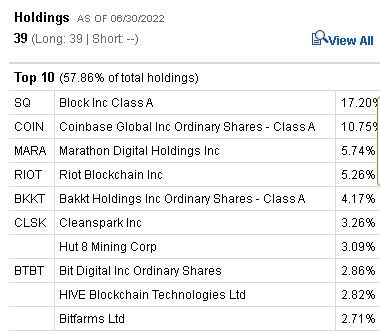Across the entire financial sector, the world of cryptocurrency is viewed as “eagerly awaiting” industry adoption. The truth though – it’s already here, and has been for quite some time.
NASDAQ
Accessibility, or the ability to easily buy and trade cryptocurrency, continues to be a major hurdle in the overall adoption. Wide spread institutional adoption continues to await the definition of clear rules and regulations for cryptocurrency. The security of Centralized Exchanges (CEX) is currently traded off with accessibility (self custody) of cryptocurrency funds.
While self custody is a major selling point to seasoned crypto veterans, the average investor or digital asset advisor has very few ways to gain exposure that doesn’t require in depth knowledge of wallets, DEXes and more… for now.

NASDAQ Inc. is best known for the NASDAQ Stock Market, an American exchange based in New York City. NASDAQ is ranked second on the list of stock exchanges in terms of market capitalization of shares traded, behind only the NYSE. NASDAQ has over 5800 employees and brought in over $5.76 billion in revenue in 2021. It is a behemoth in the traditional investing world.
NASDAQ has become the latest major financial player to place a big bet on the cryptocurrency market with the launch of NASDAQ Digital Assets on September 20th. NASDAQ appointed Ira Auerbach, a former head of Gemini (major cryptocurrency exchange) to lead the new business.
NASDAQ intends to offer customers custody options, making it (to the end user) similar to traditional stock investing. It aims to compete with Coinbase, Gemini and other custodial applications.

Fidelity, another titan in the traditional finance industry, has also dedicated line of business focusing on cryptocurrency and assets. Fidelity began researching digital assets and blockchain technology in 2014, making it one of the true major early adopters of the technology. Fidelity launched its Digital Assets line of business back in 2018 and has greatly expanded its offerings to investors.

However, in many cases, the physical ownership of cryptocurrencies is still abstracted away by a layer. If we take a look at the “Fidelity Crypto Industry and Digital Payments ETF” – it’s surprising what shows up.

Rather than seeing BTC, XRP, or any number of “payment” type tokens, Fidelity’s ETF comprises Bitcoin miners, Coinbase, Square and related companies. This makes the value of its ETF somewhat tied to the overall cryptocurrency market, but also to the health and behavior of the companies that its holdings comprise. Not quite what we are generally after (although CoinBusters is a huge fan of MARA), although this approach could be beneficial for certain investors.
NASDAQ’s approach differs. NASDAQ Digital Assets is “developing an advanced custody solution” that plans to incorporate liquidity and execution services. This implies some degree of actual asset trading rather than indirect exposure through mining companies and similar. The custody service provides an interesting wrinkle, allowing (once approved) for users to store their cryptocurrencies in a centralized location that has a storied history in the world of finance.
As a seasoned cryptocurrency investor myself, I am always hesitant to use centralized exchanges – not being able to hold and control your assets means that the exchange can make its own rules, lock you out, etc. During major market moves it has been commonplace in the industry for CEX’s to crash, often costing investors major buying or selling opportunities in the process. While the final form of NASDAQ’s offering remains to be seen (still in development), it poses a strong indicator that the world of traditional finance gets a little closer and a little more tied in with cryptocurrency every day.
















